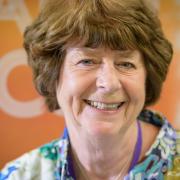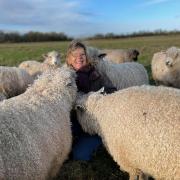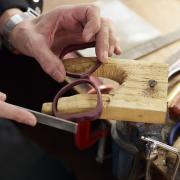Emma first fell ill with the virus back in March. Six months on, the awful impact is still being felt
For the past four months I’ve kept an overnight bag packed and ready to go by the front door. And when I’m in the bathroom, I don’t lock the door. As someone who always locks a bathroom door, even when alone in the house, this is quite telling. It’s because I don’t trust my body any more.
For four months I have felt that it could fail me at any time. I’ve felt seconds away from the point when my shortness of breath, chest pains, sore throat, fatigue and various other symptoms were no longer manageable at home.
At the beginning of all this, in early March, my natural instinct was to assume that my cough was just that - a nasty cough. Despite recent international travel, it seemed almost melodramatic to wonder if I had become infected with the novel coronavirus before our government had even declared a pandemic.
As my chest got tighter and tighter, I arranged a phone call with my GP. Probably equally disdainful of drama, he prescribed antibiotics. When they didn’t work, he prescribed an inhaler, then steroids. By now we were in lockdown and my wonderful partner Simon drove many miles around Gloucestershire to find a pharmacy that was both open and had the right medication. But nothing helped. When I found it increasingly harder to catch my breath and I lost all sense of taste and smell, I called 111.
And so began a strangely impersonal medical journey – one in which symptoms were boxes to be ticked, and I felt more like a statistic than a patient. As my list of symptoms pushed my calls up the chain of 111 operators, I was ultimately instructed to go to A&E.
The next time I called there was an ambulance at my house within 20 minutes. But unless your oxygen level is dangerously low or something shows up on an X-ray, there is literally no treatment available. After being examined by paramedics and A&E doctors, it was admission to hospital or nothing. I was delighted to be in the latter group, of course. I thanked my lucky stars to avoid the terrible state of so many unfortunate people filling the COVID wards and the ICU, but being sent home, with no medication and no advice other than to “Come back if you get any worse” was demoralising and actually rather scary.
I used to be a ballet dancer and the mentality and self-discipline of pushing through an injury never really leaves you. I’ve danced with torn muscles and bleeding toes. I’ve even danced with a broken rib, but I’ve been hugely frustrated to learn that there is no ‘pushing through’ COVID. Any minor exertion such as a few minutes of gentle gardening or washing my hair leaves me so thoroughly exhausted and short of breath that lying down is the only option. Fatigue, as a symptom, sounds almost Victorian, bringing to mind fainting-couches and smelling salts, but this fatigue isn’t about feeling sleepy (at least not for me). It feels like one of those marathon runners that you see with wobbly legs and unfocused eyes, staggering towards the finish-line, only to collapse on the ground moments later. This panic-inducing level of fatigue has been startling and immensely compromising.
And it fluctuates. I improve slightly, have a couple of good days, assume I am on the road to recovery, only to go right back to feeling horrendous again. This is more than just annoying as it poses the dilemma of what to tell all the kind people who regularly enquire about my health. Two weeks of being unwell was what the experts were telling us to expect. What kind of wimp am I if three months down the road I’m still unable to have a phone conversation that lasts more than a few minutes?
I have asked myself that constantly, questioning my resilience, my strength of spirit, even my sanity. Why was I making such a big deal of this? Why was I not getting better? Watching Boris Johnson go back to work within a couple of weeks of leaving Intensive Care just made him even more irritating than usual. And then, thankfully, people started talking about something called ‘Long COVID’.
It was such an enormous relief to know that I wasn’t the only one. Social media platforms have come into their own by bringing together a strange collection of people, all shocked and confused by their seemingly endless and widely varied post-COVID symptoms. We are the ‘Long-haulers’, or the ‘Long-tailers’. We are all different ages, with entirely different demographics, but it was the doctors, the scientists, even the epidemiologists among our ranks who, when speaking up, gave our group the gravitas to be taken seriously.
Whilst I have spoken to my GP a few times, I have not been seen by him. Other than two visits to A&E, I have pretty much been left to my own devices. I have a few medic friends who have given me advice over the phone, but to feel more unwell than I ever have in my life before and not be under regular, direct medical supervision has been very frightening.
More than a month ago I was grateful to be referred to a Respiratory Consultant, but that meeting did not go well. After the short walk from the car park to the hospital entrance, I was so short of breath that I was asked at reception if I needed a wheelchair, but the doctor himself, after deeming that nothing remarkable was evident in my test results, started asking the kind of question that revealed what direction his diagnosis was heading towards.
“How’s everything at home?”
“Exceptionally good, thank you” I replied,
“And professionally?”
“I’ve got a job waiting for me in Los Angeles as soon as it’s safe to travel, so, really good there too..”
Of course, he didn’t know me from Adam. He didn’t know that, despite my seemingly damning job title of #Actress’, I am not a neurotic or histrionic person. He didn’t know that I used to be a ballet dancer, that I have a very high pain threshold. But I had told him that, prior to COVID, I worked out with a personal trainer twice a week and was the fittest I’d been in years.
COVID-19 is a new disease. It’s certainly understandable that doctors have yet to understand its pathologies and I’m sure that this particular doctor spent most of his days fighting for people’s lives in the ITU, so my case was relatively unimpressive, but it was desperately depressing to have my very apparent breathing issues dismissed as, what amounts to, a bad habit I’d acquired since the infection.
Initially, “Try to push yourself a little more each day” was the infuriating advice from the medics. Did they really not think I was doing that already? Fortunately, now, as ‘Long-COVID’ is being seen more and more in non-hospitalised patients, and its similarity to Chronic Fatigue Syndrome has been noted, the recommendations are the opposite. CFS patients and their doctors have graciously been advising Long-COVID support groups and warning that too much physical or mental activity can cause something called ‘Post-exertional malaise (‘malaise’..? Another Victorian-sounding ailment for sure) and that it’s all about ‘pacing’. Hopefully, any research into Long-COVID will also be beneficial to the CFS patients who have been fighting for help and recognition for far too long.
Around the world, long-term COVID sufferers are speaking up about their debilitating health conditions and about doctors who tell them, like many CFS sufferers, that the issue might be all in their heads. The term ‘gaslighting’ comes up a lot. One thoughtful doctor pointed out that, when writing notes on case histories, the common use of “The patient complains of fatigue” should be replaced with “The patient is fatigued”. A subtle difference, but far more objective. And respectful.
Recently, there have been reports on a new study in the journal JAMA Cardiology, which found that 78% of recovered COVID-19 patients had permanent heart damage. The study from the University Hospital Frankfurt on 100 patients, the majority of whom had not been hospitalised and had recovered at home, had myocardial (heart muscle) inflammation even after recovery. This condition is only revealed by an MRI scan or a (potentially dangerous) biopsy and will, undoubtably, be accountable for many of the ongoing symptoms experienced by Long-COVID sufferers.
This is hugely frightening. Once this research has filtered down to local-level caregivers and the mainstream press, let’s hope that no-one will be allowed to diminish the seriousness of catching COVID-19 or ridicule mask wearers and those taking their social distancing responsibilities seriously. The whole “You’re not the boss of me” attitude of the militant mask and science deniers who selfishly put the health of others at risk is baffling to me.
Whatever the aetiology of my condition, the people who live with me have witnessed my struggles and have cared for me spectacularly well. I admit to being a bad patient. I’ve always been adamantly independent and I truly dislike being fussed over, but my daughter Micha and my partner Simon have, miraculously, found a way to keep me smiling throughout. My son, Cameron, calls me every single day and visits as often as he can. I consider myself exceptionally lucky.
But I still find it hard to admit to not feeling great. When people, so kindly, enquire about my recovery it feels like an admission of failure to say that nothing has changed. My instinct is to tell them what they want to hear and say I’m feeling a little better, even if that isn’t the case. If I’ve put on proper clothes and makeup and someone says I’m looking better, it feels ungrateful and whiny to say “Thank you, but actually I don’t feel any better”.
When I wake up every morning and, once again feel the pain in my chest and still find myself gasping for air, it’s easy to feel demoralised. I have done everything I can to fight this mindset as I’m all too aware that the mind-body connection is real and powerful. Yet, as a friend pointed out, the body-mind connection can’t be ignored either. Feeling a bit down because you’re feeling a bit shit, is understandable.
So, all I can do is take one day at a time: enjoy the things I can do and not harp after the things I can’t, for the moment, accomplish. I take pleasure in the small things; a crop of potatoes, the deer wandering through my garden, even a Tesco delivery with no substitutions, and of course, the wonderful people around me.
My heart goes out to all the people who have suffered far worse than me, either with their own illness or by losing loved ones. I know how lucky I am. Even with this new, smaller life, I am very happy indeed.



























